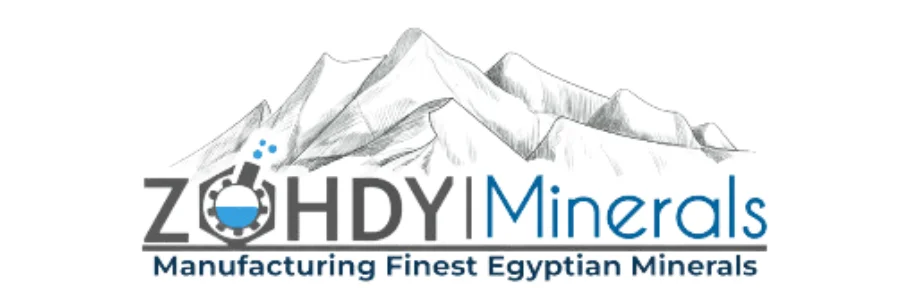Calcium Carbonate is a chemical compound with the formula (CaCO₃). It is extracted from natural sources such as limestone, marble, and chalk. You can obtain it through Zohdi Mining Company.
Calcium Carbonate is characterized by its chemical stability and its ability to react easily in various industrial processes. It is also known by many other names used in different fields, such as:
-
Limestone
Calcium Carbonate occurs naturally as limestone, which has several types:
-
Organic Limestone
composed of a large number of shells, bones, and skeletal materials.
-
Clastic Limestone
made of calcite grains of continental origin.
-
Chemical Limestone
formed by the precipitation of dissolved calcium carbonate in seawater under different temperature conditions.
-
-
Chalk
when the material is soft and porous.
-
Aragonite
one of its crystalline forms.
-
Calcite
the most common crystalline mineral form of Calcium Carbonate.
-
Lime Carbonate
a term sometimes used in certain industries.
-
Calcium Carbonate Powder (CaCO₃): a very fine, white, natural powder with the following chemical composition:
-
CaCO₃: 97.25%
-
Al₂O₃: 0.04%
-
SiO₂: 0.12%
-
MgCO₃: 2.12%
-
Fe₂O₃: 0.03%
-
What are the advantages of Calcium Carbonate from Zohdi Mining Company?
-
Abundance and Low Cos
Calcium Carbonate is widely available in nature as lim2estone, making it an economical material that reduces production costs. You can obtain it from Zohdi Mining Company.
-
Pure White Color
Its strong white color makes it ideal for industries requiring attractive aesthetics, such as paints, plastics, and artificial marble.
-
Versatile Chemical Reactivity
Calcium Carbonate has a strong ability to react with different chemicals, which enhances its use in applications requiring improved bonding between components.
-
Strength and Durability
It increases the strength and durability of products, extending their lifespan and resistance to external factors.
-
Customizable Properties
The particle size of Calcium Carbonate can be controlled to meet the needs of various industries and applications—achievable with the expertise of Zohdi Mining Company.
The role of Calcium Carbonate in artificial marble manufacturing (by Zohdi Mining Company):
-
Structural Reinforcement
Calcium Carbonate significantly enhances the hardness and structural durability of artificial marble, making the final product more resistant to pressure and external factors compared to other materials.
-
Surface Improvement
It helps improve the smoothness and gloss of artificial marble, giving it a natural marble-like appearance and increasing its market appeal.
-
Cost Reduction
As a cost-effective filler material, Calcium Carbonate reduces the need for more expensive raw materials. You can get it at competitive prices through Zohdi Mining Company.
-
Coloring and Homogeneity
Its pure white color ensures an even distribution of pigments, making artificial marble more attractive, uniform, and desirable to consumers.
-
Chemical Reactivity
In certain applications, it reacts with binders such as polyester resins to strengthen product components and increase hardness.
Thus, Calcium Carbonate is an indispensable element in artificial marble production and decorative applications in general. By combining strength, quality, and aesthetic consistency, it has become the first choice for manufacturers. As the industry develops, Calcium Carbonate remains a key material in producing high-quality, competitive products.
Use of Calcium Carbonate in Marble Industry
Calcium Carbonate plays a major role in global industry with a huge market share, as it is widely used in daily life.
Does Calcium Carbonate enter marble production ?
Yes. In addition to many other vital uses, Calcium Carbonate is highly important in the construction sector, whether as a building material itself (like marble) or as a component of cement.
Why is Calcium Carbonate used in marble?
Because of its acid-neutralizing properties. In industrial environments, it is used to neutralize acidic conditions in soil and water. When acid reacts with Calcium Carbonate on marble surfaces, it decomposes to form carbon dioxide and lime. The larger the surface area, the faster the reaction. It is also used in making mortar for binding bricks, concrete blocks, stones, roofing panels, rubber compounds, and tiles.
Advantages of Artificial Marble
-
Aesthetic Design
enhanced by pigments and colors not found in natural marble.
-
Attractive Shine
achieved by filling pores between marble particles with adhesives.
-
Easy Maintenance
scratches can be repaired easily.
-
Non-Porous Surface
unlike natural marble, it does not absorb liquid colors.
-
Easy Cleaning
using just a soft sponge.
-
Lower Cost
more economical than natural marble.
-
Easy Installation
manufactured according to precise measurements without the need for extra pieces.
Uses of Artificial Marble
-
As a substitute for ceramic, natural marble, or porcelain in flooring finishes.
-
In staircase finishes.
-
In pavement and sidewalk tiles.
For more details about Calcium Carbonate, you can contact us at Zohdi Mining Company.






